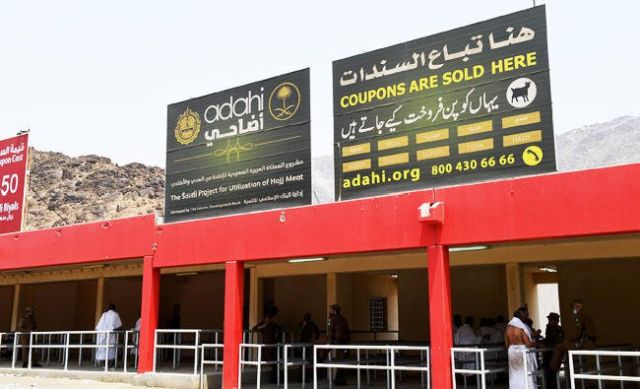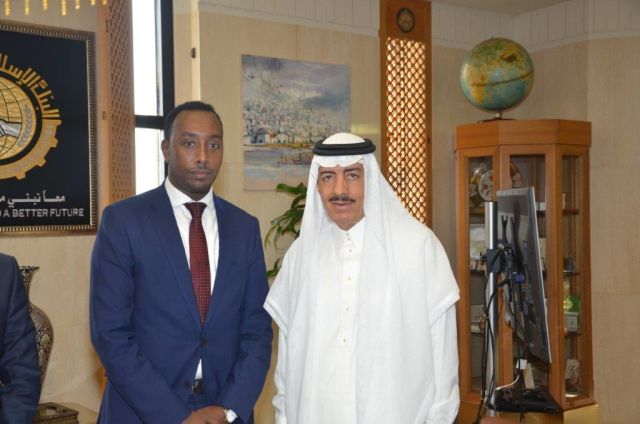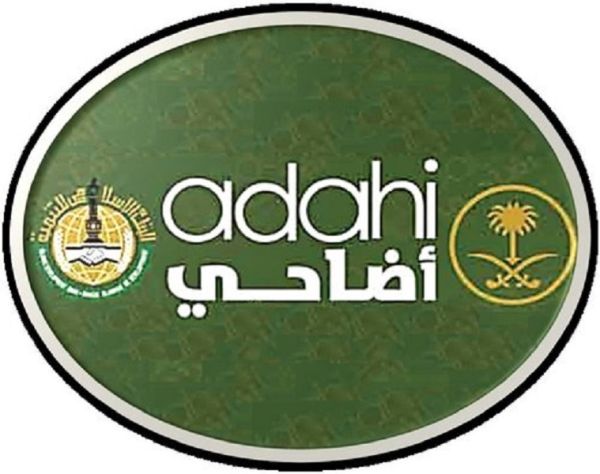
by Editor | May 25, 2021 | Halal Food, Halal Industries, Muslim World
 Makkah : The Utilization of Sacrificial Meat (Adahi) is a project undertaken by Saudi Arabia in collaboration with the Islamic Development Bank (IDB) that aims to distribute sacrificial meat among over 30 million people in 27 countries in the Asian and African continents.
Makkah : The Utilization of Sacrificial Meat (Adahi) is a project undertaken by Saudi Arabia in collaboration with the Islamic Development Bank (IDB) that aims to distribute sacrificial meat among over 30 million people in 27 countries in the Asian and African continents.
In the past Hajj seasons, people used to freeze and ship the excess meat from lamb sacrifices to their countries. The abundance of meat during Hajj became a problem over the years. Pilgrims could not eat all the sacrificed meat and it was left on the streets, causing a sanitation crisis, bad smells and disease. The authorities then would bury the meat.
Saudi scholar Saeed Al-Amoudi told Al-Hayat that the increase of pollution caused by the lamb sacrifices led the Kingdom to take the first initiative in 1983 to avoid such waste and to help the poor. The Kingdom assigned the IDB to manage the project along with the Saudi authorities.
In 2000, the Adahi project was developed, with over 40,000 employees working in different fields such as management, supervision, slaughtering, shipping and distribution.
Every year, 30,000 heads of sheep, cows and camels are slaughtered to be distributed to 30 million poor people and refugees in 27 countries in Asia and Africa.
A center for treating the excess meat was also established. The center is capable of processing 500 tons of waste per day and turning it into natural fertilizers, separated from the extracted fat that can be used in factories. Thus, the center is able to get rid of the excess meat in an eight-day period following the Hajj.
This unique project emphasizes the creative ideology of turning problems into innovative solutions, and stresses the efforts of the Kingdom to provide a better life for the less fortunate.
—AG/IINA

by Editor | May 25, 2021 | Corporate, Corporate Buzz, Muslim World
 Jeddah : The Islamic Development Bank’s “AAA” credit rating was recently reaffirmed with a “Stable Outlook” by Moody’s. Concurrently, the trust certificates issued by IDB Trust Services Ltd have also been affirmed at ‘AAA’.
Jeddah : The Islamic Development Bank’s “AAA” credit rating was recently reaffirmed with a “Stable Outlook” by Moody’s. Concurrently, the trust certificates issued by IDB Trust Services Ltd have also been affirmed at ‘AAA’.
The ratings and the stable outlook reflect the intrinsic strength of IDB; in particular its strong capital base, solid liquidity levels, strong shareholder support, prudent financial and risk management and generally low solvency risks compared with other regional multilateral development banks (MDBs). This is the 11th consecutive year that IDB is assigned “AAA” ratings by Moody’s.
The IDB remains amongst the most highly-rated MDBs and the highest in the Muslim World. The ‘AAA’ rating enhances the Bank’s capacity to mobilize external resources to fulfill its development mandate and play a leading role in development of the Islamic Finance Industry.
IDB is a multilateral development bank established in 1973 with the purpose of fostering economic development and social progress of its member countries and Muslim communities in non-member countries in accordance with the principles of Islamic Finance.
Dr. Bandar Hajjar, President of the IDB Group, congratulated all member countries, IDB Board members and staff for this important achievement. He renewed IDB’s commitment to exert maximum efforts to realize the objectives of the 2020 Vision.
—AG/IINA

by Editor | May 25, 2021 | Muslim World
 Jeddah : The Islamic Development Bank (IDB) will strongly support the government of Somalia in strengthening livestock market through capacity building for the benefit of the country’s economy.
Jeddah : The Islamic Development Bank (IDB) will strongly support the government of Somalia in strengthening livestock market through capacity building for the benefit of the country’s economy.
IDB President Dr. Bandar Hajjar disclosed this during talks with Somalia’s minister of livestock, Sheikh Nur Mohamed Hassan.
Dr. Hajjar stated that IDB welcomes capacity building at institutional and country level. “We will be happy to support Somalia with capacity building in terms of planning, strategy and creating enabling laws that will enhance the competitiveness of the livestock of Somalia. We have a large program on capacity building, and we would be happy to work together. Somalia is a special case, we would like to look at its development challenges and try to address them comprehensively.” Dr. Hajjar said.
In his remarks, Sheikh Nur Mohamed Hassan expressed his appreciation of IDB. He told Dr. Bandar Hajjar that Somalia and IDB have a lot of cooperation in various spheres of development including the Adahi project. He then asked for the support of IDB in strengthening the livestock market, which is one of the leading sectors of the Somalia economy.
—AG/IINA

by Editor | May 25, 2021 | Halal Food, Halal Industries, Muslim World
 Jeddah : Around 20,000 seasonal staffers from seven countries will be engaged in carrying out the Saudi Project for the Utilization of Sacrificial Meat (ADAHI) for this year’s Hajj.
Jeddah : Around 20,000 seasonal staffers from seven countries will be engaged in carrying out the Saudi Project for the Utilization of Sacrificial Meat (ADAHI) for this year’s Hajj.
Mousa Al-Akkasi, general supervisor of the project, said that heads of sacrificial animals, ranging between 750,000 and 900,000 are expected to be slaughtered under the project, being implemented by the Islamic Development Bank (IDB). He said that the seasonal staff includes veterinary doctors, Islamic jurists, butchers, technicians and workers from Egypt, Turkey, Jordan, Djibouti, Sudan, Lebanon and Morocco. Since commencing the project under IDB in 1403H, a total of more than 10.5 million heads of sacrificial animals have been slaughtered, of which 9.65 million distributed outside the Kingdom. This year, the poor and needy people from 27 countries will be benefitted from the sacrificial meat.
—HA/IINA

by Editor | May 25, 2021 | Halal Industries, Muslim World
 Jerusalem (IINA) – The Palestinian Housing Council (PHC) and Islamic Development Bank (IDB) signed on Monday an agreement worth $3 million to finance housing and infrastructure support project in the occupied city of Jerusalem.
Jerusalem (IINA) – The Palestinian Housing Council (PHC) and Islamic Development Bank (IDB) signed on Monday an agreement worth $3 million to finance housing and infrastructure support project in the occupied city of Jerusalem.
The agreement was signed by Engineer Hisham Al Omari, PHC representative, and Adviser Hani Abu Diab, representative of IDB which manages Al-Aqsa Fund.
Al Omari said this agreement comes within the context of enabling the groups with construction licenses to enter, within a year (a maximum period determined by Jerusalem’s official circles), into actual implementation. It will also enable the groups, which are listed in official cooperative associations for housing in Jerusalem, to complete the interior finishing works. He pointed out that 285 Jerusalemite families composed of 1,400 people will directly benefit from this deal.
Al Omari added that this agreement would achieve many goals, chiefly, encouraging the Jerusalemites to work collectively through housing cooperatives. This will facilitate licensing procedures, reduce fees and provide an opportunity for low-income families to improve their economic circumstances, as well as contributing to combating poverty and improving the social and economic situation of the beneficiaries and the local community.
Al Omari expressed thanks and gratitude, on behalf of PHC Board of Directors, to the IDB for its significant role in supporting housing projects, especially in Jerusalem city, and for the bank’s trust in the Palestinian Housing Council for the implementation of projects through these agreements.

 Makkah : The Utilization of Sacrificial Meat (Adahi) is a project undertaken by Saudi Arabia in collaboration with the Islamic Development Bank (IDB) that aims to distribute sacrificial meat among over 30 million people in 27 countries in the Asian and African continents.
Makkah : The Utilization of Sacrificial Meat (Adahi) is a project undertaken by Saudi Arabia in collaboration with the Islamic Development Bank (IDB) that aims to distribute sacrificial meat among over 30 million people in 27 countries in the Asian and African continents.



